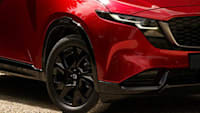NFTs, or Non-Fungible Tokens, have been getting a lot of coverage over the past year since an NFT by digital artist Beeple sold for nearly AU$100 million at auction, with trading in NFT art – and NFT scams – exploding since. However, while the automotive world has flirted with NFTs before – largely as certificates of ownership for rare or highly desirable cars – Italian automaker Alfa Romeo has announced that it will assign an NFT to every Tonale small SUV that it produces.
It’s a bold commitment for a car manufacturer given NFT tech is still in its infancy, but Alfa’s plan for implementing NFTs is really quite ingenious, and far from the bandwagon-jumping behaviour of other automakers.
Why? It’s a service record you can’t fake.
The ‘F’ in NFT stands for ‘fungible’, meaning it’s not possible to copy it or imitate it. Each NFT is, in theory, as unique as your fingerprint, and that gives them a great deal of utility when it comes to making information trustworthy.
And for Alfa Romeo’s NFT strategy, ‘trust’ is the buzzword they’re chasing, not ‘NFT’. All Tonales produced will receive their own NFT-based service record (though Alfa Romeo says its activation will be done on an opt-in principle), which will be used to track the “main stages in the life of an individual vehicle”, which we can assume to mean its production, purchase, maintenance and perhaps also any repair work and transfers of ownership.
With NFTs able to be updated with new information, they take over from traditional paper documentation and dealer-level electronic documentation as a record of what’s happened to a car, and when. For people looking to purchase a Tonale on the used-car market, having a trustworthy source of that information would no doubt be of tremendous value.
But what makes an NFT so trustworthy anyway? Because they operate on the blockchain principle, where a network of computers work together to validate the creation of tokens as well as each transaction involving them (which, in this case, would be when one of those lifetime events occurs, like an oil change or accident repair), an NFT-based record can’t be altered after the fact by a single rogue operator – they would need the network as a whole to validate the transaction, and given these events, would likely be dated as well, adding a few more oil change records to a car that’s had its scheduled servicing neglected over time simply wouldn’t be possible.
But what else could be stored on a vehicle’s NFT? Well, as it turns out, almost anything.
“Never raced”
.jpg)
‘Black box’ data, for one. Modern car electronic control units (ECUs) are capable of recording a surprising level of data, with peak data such as engine speed, vehicle speed, brake activation and more often living as a record on an ECU until overwritten by new data, or cleared by a technician. That info typically stays on the car until required (either by technicians trying to diagnose a fault or, more grimly, accident investigators trying to piece together the circumstances of a crash), but that info could potentially be written to an NFT as well.
Does the seller say they never took the car to the racetrack, or that it was only used to go to church on Sundays? Looking up the NFT might tell a different story.
Quality ingredients
.jpg)
Now, Alfa Romeo has only just announced the NFT feature of the Tonale, so details are still scant (we don’t, for example, even know what specific blockchain it will operate on), but something that would certainly help boost the trustworthiness aspect of the Tonale’s NFT service record would be details on precisely which parts were used in it upkeep.
Were they brand-new genuine parts? Were they remanufactured originals? Perhaps they were aftermarket instead? All of that could be recorded on the NFT, along with any other pertinent information like the specific part number or even its serial number. Not only would that add transparency to the service record, but it could make it a lot easier for the manufacturer to issue recalls in a faster and more targeted fashion.
But… it’s not perfect.
.jpg)
As smart as Alfa Romeo’s NFT idea is, it’s not entirely infallible. For starters, one would assume that an Alfa Romeo service department would know how to keep the NFT updated, and have the incentive to actually do it, but what happens when a car goes outside of that system and is taken to an independent mechanic? Will Alfa Romeo share the necessary information with third parties, or withhold it to compel owners to stay within its dealership ecosystem?
There’s also the potential environmental cost. NFTs are notorious for being particularly energy-intensive to create and transact (remember, a whole network of computers is generally needed to create them, and these networks can number millions of computers), and adding indirect CO2 emissions to a car doesn’t’ seem like a wise move in 2022.
However, we don’t know what blockchain Alfa Romeo will be using, and not all NFT blockchains work on energy-intensive principles. In fact, some have deliberately adopted a far less demanding methodology (if you feel like getting sucked into a Wikipedia vortex, look up the differences between ‘proof of work’ and ‘proof of stake’) and it would be reasonable to assume that Alfa Romeo would go with one of those options. At this point, though, we simply don’t know. Nor do we know if Australia-bound cars will have the NFT feature activated, and we probably won't find out until its local debut in 2023.
But what is apparent is that this is definitely the first mature use case for NFT technology as a tool, rather than a speculative investment instrument or a digital certificate of authenticity. It will not only be interesting to see how it’s implemented once the Tonale enters showrooms, but also what brands adopt the technology as well. With Alfa Romeo being part of the Stellantis family, NFT cars could spread to brands like Chrysler, Dodge, Peugeot, Citroen, Opel and Jeep in the not-too-distant future.








.jpg)







.jpg)



.jpg)
.jpg)
.jpg)
.jpg)
.jpg)


.jpg)

.jpg)